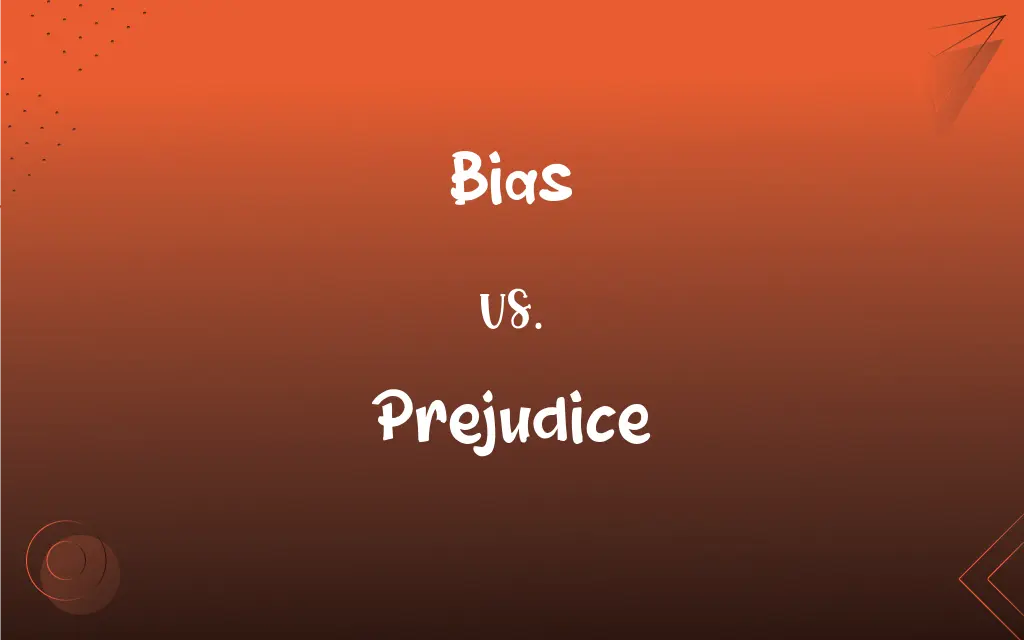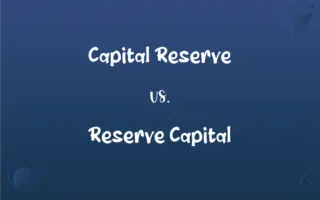Bias vs. Prejudice: What's the Difference?
Edited by Harlon Moss || By Aimie Carlson || Published on November 26, 2023
Bias refers to an inclination or preference, either positive or negative, that affects judgment. Prejudice refers to preconceived opinion or judgment, often based on irrational or insufficient information.

Key Differences
Bias refers to a tendency, inclination, or prejudice toward or against something or someone. It can be conscious or unconscious and is often based on stereotypes, rather than actual knowledge of an individual or circumstance. Prejudice, on the other hand, is a preconceived opinion or feeling, often negative, directed toward people because of their membership in a particular group.
Bias can influence our views and actions subtly, without us being aware of its impact. It can shape our perspectives in various aspects of life, including social, professional, and academic settings. Prejudice, however, is more blatant and is often characterized by negative feelings, opinions, or attitudes towards a person or group without sufficient reason.
Bias can manifest in different forms, such as confirmation bias where we favor information that confirms our existing beliefs. While, prejudice is typically more deep-rooted and can lead to discrimination, which is the unjust or prejudicial treatment of different categories of people, often on the grounds of race, or age.
Bias can be altered or minimized through awareness and education. Individuals can learn to recognize their biases and work to address them. Whereas, prejudice, being more ingrained and often based on societal or cultural norms, requires a more extensive process to change, involving education, understanding, and often societal change.
Bias and prejudice both impact decision-making and social interactions but differ in their origin and degree of impact. Bias often stems from our background, cultural environment, and personal experiences. Prejudice is more about preconceived notions that are not based on actual experience or rational argument.
ADVERTISEMENT
Comparison Chart
Definition
A partial perspective favoring one side
A preconceived judgment or opinion
Origin
Often unconscious and shaped by experiences
Generally a conscious belief, often based on stereotypes
Manifestation
Can be subtle or indirect
Usually explicit and direct
Changeability
More amenable to change through awareness
More resistant to change, often requiring broader societal efforts
Impact
Affects judgment and decision-making
Leads to discrimination and negative treatment of groups
ADVERTISEMENT
Bias and Prejudice Definitions
Bias
Bias implies a tendency to lean in a certain direction, often to the detriment of an open mind.
Her bias against modern art prevented her from appreciating the exhibition.
Prejudice
Prejudice is a preconceived opinion not based on reason or actual experience.
His prejudice against cyclists led him to make unfair assumptions.
Bias
Bias is a preference or inclination, particularly one that inhibits impartial judgment.
His decision was influenced by his bias towards his alma mater.
Prejudice
In law, prejudice refers to a preformed judgment or bias that may affect justice.
The case was dismissed due to the jury’s evident prejudice.
Bias
Bias can also mean a slant or specific perspective in presentation or reporting.
The article showed a clear bias in favor of the new policy.
Prejudice
Prejudice involves judging or forming an opinion about someone or something prematurely and without all the facts.
Her prejudice against the new employee was based on hearsay.
Bias
Bias can refer to a systematic deviation from the truth in data collection.
The survey results were skewed due to a sampling bias.
Prejudice
Prejudice is an irrational attitude of hostility directed against an individual, a group, a race, or their supposed characteristics.
His comments revealed a deep-seated racial prejudice.
Bias
In a professional context, bias can manifest as unfair favoritism towards or against someone or something.
The manager’s bias towards his relatives affected team morale.
Prejudice
Prejudice can also denote an unjustified or incorrect attitude (usually negative) towards an individual based solely on their membership of a social group.
Age prejudice in the workplace often goes unnoticed.
Bias
A line going diagonally across the grain of fabric
Cut the cloth on the bias.
Prejudice
The act or state of holding unreasonable preconceived judgments or convictions
“This is not actually a volume of the best short stories … These are just the stories that I like best, and I am full of prejudice and strong opinions” (Ann Patchett).
Bias
A preference or an inclination, especially one that inhibits impartial judgment.
Prejudice
An adverse judgment or opinion formed unfairly or without knowledge of the facts
A boy with a prejudice against unfamiliar foods.
Bias
An unfair act or policy stemming from prejudice.
Prejudice
Irrational suspicion or hatred of a particular social group, such as a race or the adherents of a religion.
FAQs
What is bias?
Bias is an inclination or tendency that affects one's judgment or perspective, either consciously or unconsciously.
Is prejudice always negative?
Prejudice is predominantly negative as it involves preconceived negative judgments.
How does bias differ from prejudice?
Bias is a broader term, often unconscious and based on one's background, whereas prejudice is a conscious belief, usually negative, and often based on stereotypes.
Are biases always conscious?
No, many biases operate on an unconscious level, influencing decisions without explicit awareness.
How does cultural background influence bias?
Cultural background shapes our values and perspectives, which can lead to biases based on those cultural norms.
Can education reduce prejudice?
Yes, education can play a key role in reducing prejudice by providing factual information and encouraging empathy.
Can bias be positive?
Yes, bias can be positive or negative, depending on the inclination or preference.
How does prejudice affect society?
Prejudice can lead to social divisions, discrimination, and injustice, negatively impacting societal harmony.
What is prejudice?
Prejudice is a preconceived opinion or judgment about someone or something that is not based on reason or actual experience.
Is it possible to be completely unbiased?
It's challenging to be completely unbiased as biases are a part of human nature, but awareness and effort can reduce their impact.
What is the impact of prejudice in the workplace?
Prejudice in the workplace can lead to unfair treatment, discrimination, and a hostile work environment.
Is it possible to be unbiased in judicial decisions?
While challenging, judicial systems strive for unbiased decisions through legal standards and impartiality.
Can bias be measured?
There are various methods to measure bias, including implicit association tests and observational studies.
Can biases change over time?
Yes, biases can change as one gains new experiences, knowledge, and perspectives.
How do stereotypes relate to prejudice?
Stereotypes are oversimplified generalizations about a group, which often form the basis for prejudice.
How do biases affect decision-making?
Biases can lead to flawed decision-making by skewing one's perception and evaluation of information.
How can one recognize their own biases?
Recognizing one's biases involves self-reflection, seeking feedback from others, and being open to different perspectives.
What role does media play in shaping biases and prejudices?
Media can significantly influence biases and prejudices by how it portrays certain groups or issues.
How can one confront their prejudices?
Confronting prejudices involves acknowledging them, understanding their origins, and actively challenging them.
Can societal norms influence biases and prejudices?
Yes, societal norms and values significantly influence the formation and perpetuation of biases and prejudices.
About Author
Written by
Aimie CarlsonAimie Carlson, holding a master's degree in English literature, is a fervent English language enthusiast. She lends her writing talents to Difference Wiki, a prominent website that specializes in comparisons, offering readers insightful analyses that both captivate and inform.
Edited by
Harlon MossHarlon is a seasoned quality moderator and accomplished content writer for Difference Wiki. An alumnus of the prestigious University of California, he earned his degree in Computer Science. Leveraging his academic background, Harlon brings a meticulous and informed perspective to his work, ensuring content accuracy and excellence.






































































